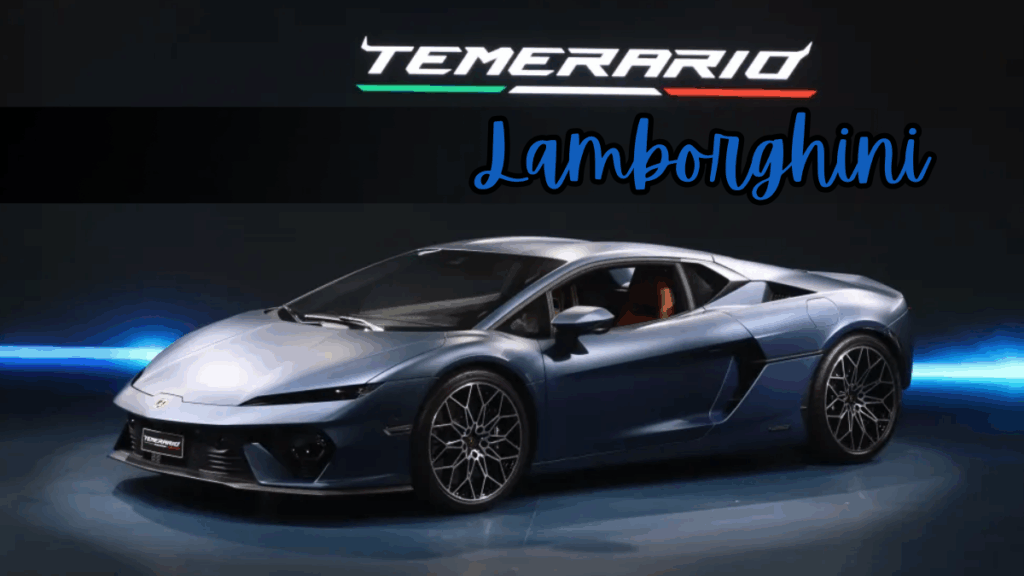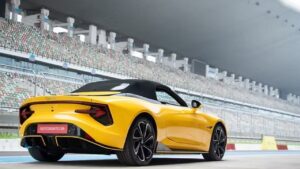The Lamborghini Temerario replaces the beloved Huracán and does so without trying to mimic its naturally aspirated V10 theatrics. Instead, it embraces a high-revving twin-turbo V8 hybrid and a brainy, torque-vectoring e-axle that make it faster, friendlier, and far more sophisticated on road and track. We drove it at Portugal’s Estoril Circuit to understand how this radical new Lambo rewrites the hybrid supercar rulebook.
A New Kind of Lambo: From Mechanical Fury to Intelligent Force
Following the Huracán’s operatic V10 was always going to be difficult. The Temerario does not chase that sound. It changes the conversation: a flat-plane crank V8 that spins to 10,000 rpm sits at the core, assisted by three electric motors one between engine and transmission, two on the front axle. The result is eerily immediate throttle response, relentless shove to the redline, and surgical torque vectoring that pulls the nose into apexes with precision the Huracán could never match.
The 3.8 kWh battery is sized for performance, not long EV stints. Still, Città mode gives roughly 10 km of silent running for stealthy early-morning departures. Everywhere else, the e-motors fill any torque gaps and add fine control, making the Temerario feel telepathic under power.
Key Highlights (At a Glance)
Item |
Details |
|---|---|
Powertrain |
4.0-litre twin-turbo V8 + 3 e-motors (axial-flux) |
System Output |
920 hp (800 hp ICE + e-assist), 730 Nm (ICE) |
Battery |
3.8 kWh lithium-ion; ~10 km EV range in Città mode |
Transmission |
8-speed dual-clutch automatic |
Performance |
0–100 km/h in 2.7 s; top speed 343 km/h (claimed) |
Chassis |
New all-aluminium space frame; +20% torsional rigidity |
Dynamics |
e-axle torque vectoring, MagneRide Evo dampers, rear e-motor fill |
Aero |
Active package; up to +35% downforce vs Huracán Evo (claimed) |
Drive Modes |
Città (EV-leaning), Strada, Sport, Corsa; optional Rally |
Dimensions |
L/W/H: 4,706/1,996/1,201 mm; WB: 2,658 mm |
Tyres |
255/35 ZR20 (F), 325/30 ZR21 (R) |
India Price |
~₹6 crore ex-showroom (indicative) |
Official Site |
Chassis, Steering, and Damping: Confidence at the Limit
The new all-aluminium space frame is 20 percent stiffer in torsion, providing a rock-solid base for the double-wishbone suspension and MagneRide Evo dampers. The dampers react faster and more subtly than before, flattening pitch and roll while preserving road feel. On quick transitions at Estoril, the car stayed calm, flat, and communicative, letting you lean on it sooner and harder.
Front-axle e-motors deliver ultra-precise torque vectoring; in Corsa, it genuinely feels like the front is being pulled into the corner. The electronically controlled rear differential and the front motors work in concert to rotate the car with throttle inputs alone. It is a car that invites exploration even at the limit it remains friendly, progressive, and predictable.
The steering benefits from a quicker rack and more rigid mounting. It is lighter, cleaner, and more accurate than in the Huracán. Rear-axle steering is not required here the clever e-axle and chassis tuning generate the desired agility and stability envelope.
Aerodynamics: Shape-Shifting Downforce
The active aero package delivers up to 35 percent more downforce than a comparable Huracán Evo setup, with a front splitter, a worked underbody, an assertive diffuser, and an active rear wing. In Corsa, the wing sits high for maximum grip; in Strada, it tucks away to reduce drag and improve efficiency. The underfloor now plays a lead role, smoothing and accelerating airflow for consistent downforce without excess drag.
Engine, Gearbox, and Sound: Different Drama, Same Adrenaline
On the main straight, the Temerario’s 920 hp system output translates to a single, seamless surge no lag, no step-ups, just thrust. The 8-speed DCT bangs home upshifts with authority and blips downshifts cleanly, whether you are cruising or attacking. The note is deeper and more guttural than the old V10’s shriek; less histrionic, but raw and compelling especially past 7,000 rpm as it charges toward five-figure revs.
Braking combines recuperation and CCM-R carbon-ceramic hardware. Pedal feel is natural and confidence-inspiring, fade resistance is excellent, and the system remains consistent over extended hot laps.
Modes and LDVI 2.0: A Wider Personality Spectrum
LDVI 2.0 (Lamborghini Dinamica Veicolo Integrata) fuses inputs from yaw, steering angle, vertical load, throttle, brake, and wheel speeds to orchestrate torque split, damping, aero, and e-motor contributions in milliseconds. Modes are clearly delineated:
- Città: EV-leaning, subdued responses, urban serenity.
- Strada: Daily-drive compliant, balanced ride and response.
- Sport: More rear bias, livelier attitude, enhanced theatrics.
- Corsa: Maximum attack, tight body control, peak aero and response.
- Rally (optional): Looser surfaces, broader slip window Sterrato-inspired playfulness.
A dedicated Drift calibration offers staged slip levels, allowing opposite-lock showboating with a safety net.
Design and Cabin: Sharper Sophistication, Less Snarl
The Temerario evolves Lamborghini’s design language. Hexagonal signatures remain lighting elements, vents, and high-mounted exhausts—but the angry Y-DRL from Huracán steps aside to reserve that motif for the Revuelto. The result is sleeker and more polished, with less overt menace and more mature restraint. From the rear three-quarter, the stance and proportions are pure supercar.
Inside, the fighter-jet vibe is refined with three screens driver display, central touchscreen, and an optional passenger screen plus wireless charging, USB-C, and vastly improved seating and ergonomics. Storage is still minimal (door pockets remain absent), but overall comfort is leagues better, making this the first Lambo you might not mind in traffic.
Dimensions and Tyres
- L/W/H: 4,706 / 1,996 / 1,201 mm
- Wheelbase: 2,658 mm
- Tracks (F/R): 1,722 / 1,670 mm
- Tyres: 255/35 ZR20 (front), 325/30 ZR21 (rear)
- Dry Weight: 1,690 kg
Price and Positioning in India
At roughly ₹6 crore ex-showroom, the Temerario sits well above the Huracán Tecnica it replaces and even north of Ferrari’s 296 GTB in India. On paper and on track, the Temerario justifies the delta with greater performance, technology, and breadth of ability but buyers should note the premium is meaningful in this market.
Frequently Asked Questions (FAQs)
Q1. What is the total power output of the Lamborghini Temerario?
The combined system output is 920 hp, from a twin-turbo V8 and three electric motors.
Q2. How quick is it from 0–100 km/h and what is the top speed?
Lamborghini claims 0–100 km/h in 2.7 seconds and a 343 km/h top speed.
Q3. Does it have an EV-only mode?
Yes. In Città mode, the car can cover about 10 km on electric power alone for low-speed, short urban trips.
Q4. What makes the handling so different from the Huracán?
A front e-axle with torque vectoring, a stiffer aluminium space frame, and MagneRide Evo dampers deliver sharper turn-in, greater stability, and friendlier limits.
Q5. How does the design differ from recent Lamborghinis?
The Temerario leans into hexagonal themes and a sleeker face, reserving the dramatic Y-signature for the Revuelto to create clearer model separation.
Q6. What is the indicative price in India?
Expect around ₹6 crore ex-showroom, positioning it above the Huracán Tecnica and the Ferrari 296 GTB locally.
Verdict: The Most Complete Lambo Sports Car Yet
No, it does not recreate the Huracán’s naturally aspirated V10 theatre. Instead, the Temerario defines a new Lamborghini era: one of intelligent, electrically enhanced savagery. It is faster, calmer at the edge, and vastly more capable. In short, it is the most rounded bull yet and that is revolutionary in its own right.
Official Website
For specifications, options, and configurator: https://www.lamborghini.com
For More Information Click HERE





